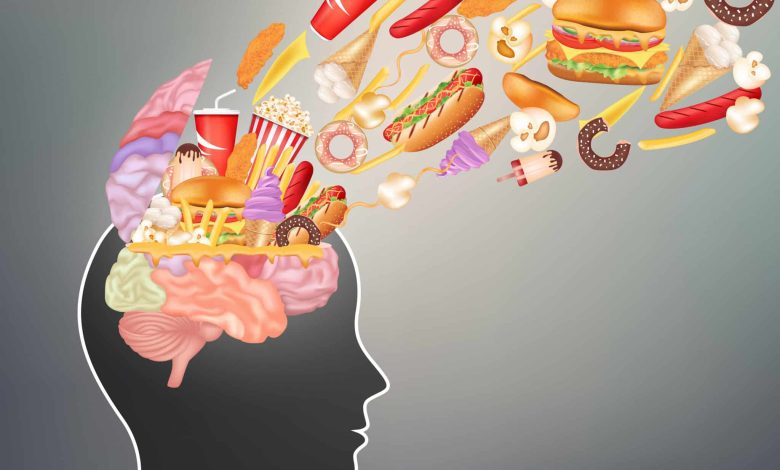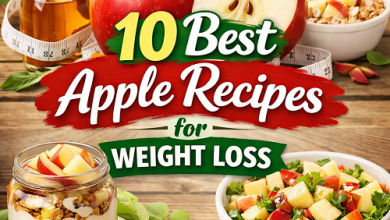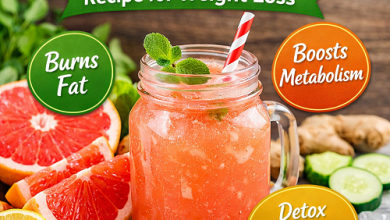The Surprising Mental Health Consequence of Junk Food—Study Shows a Clear Depression Link!

Most people already know that junk food can wreak havoc on physical health—causing obesity, increasing the risk of diabetes, contributing to heart disease, and weakening the immune system. But what if the real danger is hidden somewhere far less obvious? What if your favorite fast-food burger, sugary drink, or late-night processed snack isn’t just affecting your waistline—but also damaging your mental health?
A growing body of scientific research now points to a clear and troubling connection: junk food consumption is strongly linked to higher rates of depression. This shocking finding has transformed the way experts understand mental well-being, diet, and the intricate relationship between the gut and the brain.
The science behind this surprising link, what researchers say about the impact of unhealthy foods on mood, and what changes you can make to protect both your physical and emotional health.
Why Junk Food Is More Dangerous Than We Thought
Junk food is typically high in:
- Processed sugars
- Refined carbohydrates
- Trans fats
- Artificial colors and preservatives
- Excess sodium
- Low-quality oils
These ingredients are known to cause inflammation, spike blood sugar levels, and disrupt hormonal balance. But beyond these physical effects, they also influence key neurotransmitters—such as serotonin, dopamine, and norepinephrine—that regulate mood, motivation, and emotional stability.
What makes this incredibly concerning is that most people don’t associate diet with mood. They may link sugary snacks to energy crashes or too much caffeine to anxiety, but few realize that long-term dietary patterns can alter the brain itself.
The Study That Shocked the Mental Health Community
A recent, large-scale study conducted across several countries found a direct association between high junk food consumption and an increased risk of depression. More than 100,000 participants were tracked to analyze how their food habits affected their mental health over time.
The results were alarming:
- People who consumed high amounts of processed foods were 51% more likely to develop depression.
- Those who ate ultra-processed foods daily showed the highest rates of depressive symptoms.
- Individuals who replaced junk food with whole foods experienced significant improvements in mood within weeks.
Researchers concluded that it wasn’t just lifestyle factors at play—the food itself was influencing brain chemistry, gut health, and emotional balance.
The Gut–Brain Connection: Why Food Shapes Your Mood
To understand why junk food affects mental health, you must look at the gut–brain axis—a communication system linking your digestive system to your central nervous system.
Here’s how it works:
1. Your gut produces 90% of your serotonin
Serotonin is a neurotransmitter responsible for regulating:
- Mood
- Sleep
- Appetite
- Emotional wellness
- Motivation
When your gut health is compromised—due to processed foods, artificial additives, or poor nutrition—serotonin production drops. This increases the risk of mood disorders, including depression.
2. Junk food causes chronic inflammation
Chronic inflammation is now recognized as one of the main contributors to depression. Ultra-processed foods trigger inflammation by:
- Damaging gut lining
- Encouraging harmful bacteria growth
- Triggering immune responses
- Flooding the body with inflammatory cytokines
These cytokines travel through the bloodstream to the brain, affecting neurotransmitters and leading to depressive symptoms.
3. It disrupts the microbiome
Your gut microbiome is the ecosystem of bacteria that support digestion, immunity, and mental health. Junk food destroys beneficial bacteria and feeds harmful strains.
An unbalanced microbiome (dysbiosis) is directly linked to:
- Mood disorders
- Anxiety
- Depression
- Memory problems
4. Blood sugar spikes create mood instability
Sugary foods cause rapid rises and falls in blood sugar. This roller-coaster effect disrupts mood regulation and increases irritability, fatigue, and emotional sensitivity.
What the Research Says: More Studies Confirm the Link
The depression–junk food connection isn’t based on a single study. Several scientific papers have solidified this link.
• Harvard University Findings
Harvard researchers found that a diet high in refined carbs and added sugars increases the risk of depression by up to 40%.
• The University College London (UCL) Study
Men who regularly consumed fast food, sugary drinks, and processed meats were more likely to develop depression compared to those who ate whole foods.
• Mediterranean Diet Research
Individuals switching to a Mediterranean-style diet—rich in whole grains, lean proteins, fruits, vegetables, and healthy fats—reported:
- Reduced depression symptoms
- Improved mood stability
- Lower inflammatory markers
This shows that nutrition isn’t just linked to physical health—it is a crucial part of mental well-being.
Why We Crave Junk Food When Depressed
One of the most fascinating aspects of this link is that the relationship is bidirectional: junk food increases depression, and depression increases junk food cravings.
Why?
1. Dopamine-driven cravings
Junk food releases dopamine—the brain’s “pleasure hormone.” People experiencing sadness, stress, or emotional overwhelm often seek quick dopamine fixes.
2. Emotional eating
Depressed individuals may turn to comfort foods for temporary relief. But these foods worsen mood long term.
3. Fatigue from depression
Depression reduces motivation, making fast, convenient junk foods more appealing.
4. Sleep deprivation
People suffering from depression often experience sleep issues, which increase cravings for sugary, high-calorie foods.
This creates a dangerous cycle:
Depression → Junk Food → More Depression
Top Junk Foods Linked to Depression
Some processed foods are especially harmful to mental health due to their inflammatory and chemical content:
- Sugary beverages (soft drinks, energy drinks)
- Fast food (burgers, fries, fried chicken)
- Packaged snacks (chips, crackers, instant noodles)
- Processed meats (sausages, deli meats, hot dogs)
- Sugary desserts (cakes, pastries, doughnuts)
- Frozen meals
- Candy and chocolate bars
- Refined white bread and pasta
A diet heavy in these foods dramatically increases emotional highs and lows, irritability, and depressive symptoms.
Replacing Junk Food With Mood-Boosting Options
Fortunately, even small dietary changes can significantly improve mental health.
Here are mood-boosting alternatives backed by science:
1. Omega-3 Rich Foods
Omega-3 fatty acids improve brain function and reduce depression symptoms.
- Salmon
- Tuna
- Flaxseed
- Walnuts
- Chia seeds
2. Whole Grains
Whole grains regulate blood sugar and stabilize mood.
- Brown rice
- Quinoa
- Oats
- Whole wheat bread
3. Fermented Foods
These restore gut health and decrease anxiety and depression.
- Yogurt
- Kefir
- Kimchi
- Sauerkraut
4. Dark Leafy Greens
High in folate and B vitamins, which are essential for neurotransmitter production.
- Spinach
- Kale
- Collard greens
5. Fruits & Vegetables
Rich in antioxidants and fiber, they reduce inflammation and boost brain health.
6. Lean Proteins
Support neurotransmitter production.
- Chicken
- Beans
- Lentils
- Eggs
How Quickly Can Diet Improve Depression Symptoms?
Some people report improvements in as little as two weeks, while others notice changes after two to three months. The timeframe depends on:
- Severity of depression
- How much junk food is eliminated
- Improvement in gut health
- Sleep and physical activity levels
The good news: the brain is highly adaptable. With better nutrition, it can rebuild, rebalance, and recover.
The Psychological Impact of Eating Healthy
When individuals shift from junk food to whole foods, they often notice:
- More stable mood
- Higher energy levels
- Better sleep
- Reduced anxiety
- Enhanced focus
- Fewer mood swings
- Improved self-esteem
These benefits create a positive cycle:
Healthy Food → Better Mood → Better Food Choices
Why Governments and Health Experts Are Concerned
Public health experts now warn that ultra-processed foods are becoming the new tobacco—addictive, harmful, and silently destroying mental health.
Key concerns include:
- Rising depression rates among teenagers and young adults
- Increasing availability of cheap junk food
- Aggressive marketing targeting children
- Ultra-processed foods becoming dietary staples worldwide
This is why some countries are now introducing:
- Warning labels on processed foods
- Taxes on sugary drinks
- Restrictions on junk food advertising
- School programs promoting whole foods
Lifestyle Habits That Boost the Effects of a Healthy Diet
A healthy diet works even better when combined with other mood-boosting habits:
1. Regular exercise
Releases endorphins and improves serotonin transmission.
2. Adequate sleep
Repairs the brain and regulates mood.
3. Stress management
Meditation, yoga, and deep breathing reduce inflammation.
4. Social interaction
Prevents isolation, a major factor in depression.
5. Hydration
Even mild dehydration can worsen mood.
Can You Still Eat Junk Food Occasionally?
The key is moderation.
Eating a burger once in a while won’t trigger depression, but making processed foods a regular part of your diet will. The problem arises when:
- Junk food replaces whole foods
- Ultra-processed meals are eaten daily
- Sugary drinks become a habit
A balanced diet allows occasional treats without damaging mental health.
Final Thoughts: Your Diet May Be the Missing Piece of the Mental Health Puzzle
The link between junk food and depression is no longer a theory—it’s a scientific reality. What you eat plays a crucial role in how you feel, how you think, and how your brain functions.
By understanding this connection, you gain the power to protect your mental well-being through simple daily choices.
You don’t need to overhaul your diet overnight. Start small:
- Replace one junk food item with a whole food.
- Add one serving of vegetables daily.
- Swap sugary drinks for water or herbal tea.
Over time, these small steps can lead to profound improvements in both physical and emotional health.




